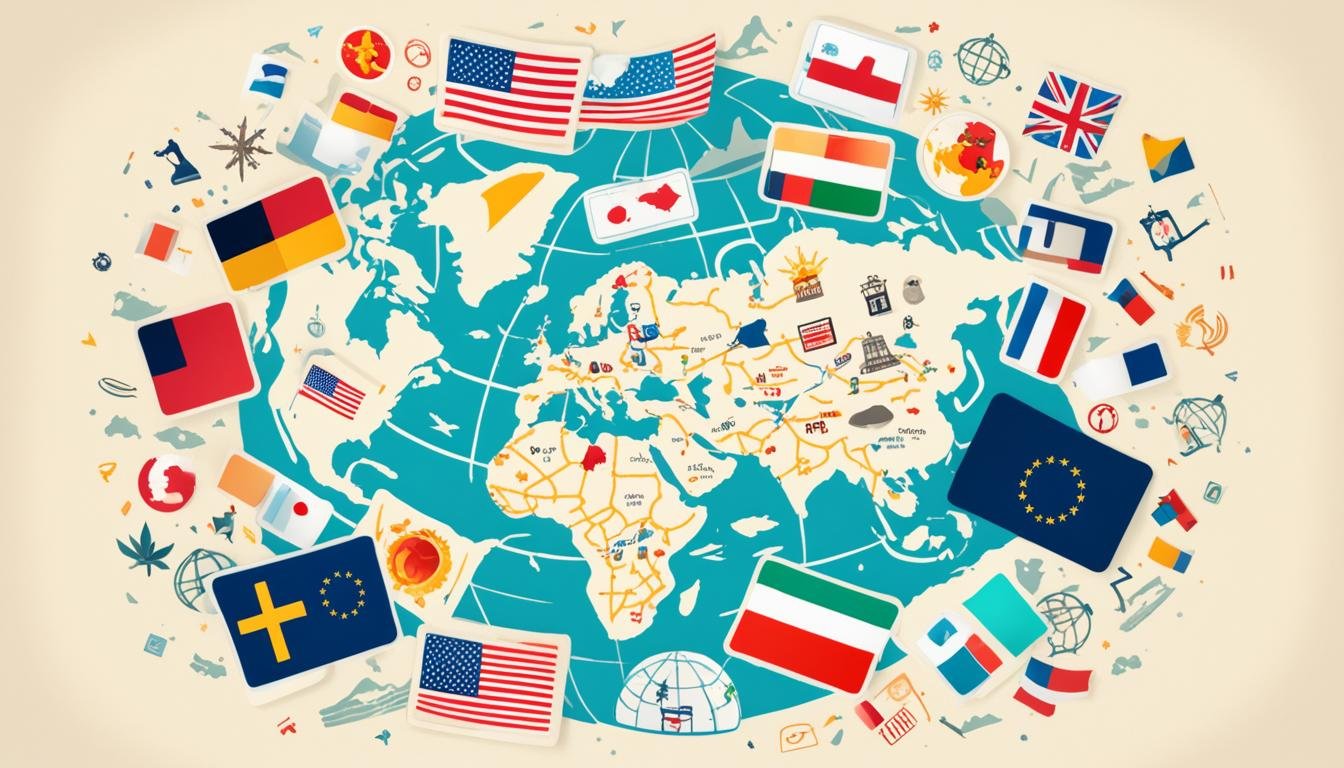Digital Nomad Visas: Countries offering special visas for remote workers and how to apply.
Ever thought about working while traveling the world? With more people working remotely, many countries now offer Digital Nomad Visas. These visas let professionals work and travel at the same time. This article will cover which countries have these visas, how to get them, and what benefits they offer.
The COVID-19 pandemic in 2020 changed how we work, leading many countries to start Digital Nomad Visas. These visas are for remote workers and offer longer stays, often up to 12 months. Some even give tax breaks. Over 50 countries now have these programs, welcoming remote workers to live and work in new places.
Key Takeaways
- Europe boasts the highest number of Digital Nomad Visa programs.
- 39 countries currently provide Digital Nomad Visa options.
- Cabo Verde requires an average bank balance of about $1,585 for solo travelers.
- Mauritius offers a long-term remote work visa free of charge.
- Namibia mandates a monthly income of at least $2,000 for visa eligibility.
Introduction to Digital Nomad Visas
Remote work has led to a new way of living and working—digital nomadism. Governments now offer Work From Anywhere Permits, or Remote Worker Visas, to draw in remote workers. These permits let people live in another country while working remotely for a company elsewhere.
What is a Digital Nomad Visa?
A Digital Nomad Visa is a special visa for remote workers. It lets people stay in a country for a long time while working remotely. This visa is for those who want to live and work from anywhere without the limits of short-term tourist visas.
Benefits of Digital Nomad Visas
Digital Nomad Visas have many perks. They allow for longer stays than tourist visas, letting workers dive deep into new cultures. Some places even offer tax breaks to attract remote workers. For example, Dominica has an 18-month visa for remote workers, while Estonia’s visa needs a minimum income of €3,504 and a fee of €80 to €100.
General Application Requirements
Applying for a Digital Nomad Visa usually means showing you have a steady income, a valid passport, and sometimes, you need to prove you have a place to stay. Countries like Croatia ask for a monthly income of €2,870, while Costa Rica wants a monthly income of $2,500 USD. Each country has its own rules, but they all want to make sure you can support yourself financially.
Here’s a table showing the requirements for some popular Digital Nomad Residencies:
| Country | Visa Name | Income Requirement |
|---|---|---|
| Dominica | Work In Nature | $50,000/year |
| Estonia | Digital Nomad Visa | €3,504/month |
| Croatia | Temporary Stay for Digital Nomads | €2,870/month |
| Costa Rica | Rentista | $2,500 USD/month |
Tax Implications
Taxes for digital nomads vary a lot by country. Some places offer low taxes or no taxes to attract remote workers. For example, the Czech Republic’s Zivno visa needs proof of income equal to 1.5 times the average salary, which might mean lower taxes. But, some countries might charge standard taxes on Digital Nomad Residencies. It’s a good idea to talk to a tax advisor to understand your taxes fully.
The trend of Work From Anywhere Permits shows that governments see the value in attracting remote workers. They offer Remote Worker Visas or Digital Nomad Residencies to welcome this new way of working. This opens up the world to more work flexibility and cultural exchange.
European Countries Offering Digital Nomad Visas
European countries are at the forefront in offering digital nomad visas. These visas are great for remote workers who want to live in Europe while keeping their jobs. Here are some top places that offer these visas:
Spain
Spain is known for its lively culture and beautiful views. It welcomes digital nomads with a visa that requires a monthly income of €2,140. This visa lets remote workers enjoy Spanish life and work at the same time.
Portugal
Portugal started the Portugal Digital Nomad Visa in October 2022. You need to make at least €3,280 (about $3,582) each month to apply. Portugal is a great choice for digital nomads, offering tax residency after 183 days.
Croatia
Croatia is a beautiful place with a stunning coastline. To get the Croatian Digital Nomad Visa, you need to show you make €2,363.55 a month or have €28,380 in the bank for a year. Croatia is a top spot for digital nomads thanks to its clear visa rules.
Germany
Germany is famous for its strong economy and culture. It offers a Freelancer Visa for different jobs. You must prove you have a steady income from your work. Germany is a key place for digital nomads thanks to its detailed visa policies.
These European countries are very welcoming to digital nomads. Each has its own rules and benefits. This gives digital nomads many great options for where to live and work next.
| Country | Monthly Income Requirement | Additional Notes |
|---|---|---|
| Spain | €2,140 | Minimum income requirement. |
| Portugal | €3,280 | Option for tax residency after 183 days. |
| Croatia | €2,363.55 | Bank balance alternative for a 12-month stay. |
| Germany | Varies | Sustainable self-employment income required. |
Latin American and Caribbean Locations
Latin America and the Caribbean are great for remote work. They have beautiful places and good Digital Nomad Visa programs. You can work and enjoy life here, but you must meet certain financial needs.
Costa Rica
Costa Rica’s Digital Nomad Visa, also known as the Rentista visa, is special. It needs a monthly income of $3,000. You can stay for up to a year and renew it for more time. This visa lets you work and enjoy Costa Rica’s beauty.
| Country | Monthly Income Requirement | Visa Duration |
|---|---|---|
| Costa Rica | $3,000 | 1 year (renewable) |
Barbados
Barbados has the Welcome Stamp program for digital nomads. You need to earn $50,000 a year to stay for a year. It’s perfect for remote workers who want to enjoy Barbados’s lively culture and beautiful beaches.
Antigua & Barbuda
The Nomad Digital Residence visa in Antigua & Barbuda is another great choice. You can stay for two years with a yearly income of at least $50,000. It’s a peaceful place for digital nomads to work and relax.
| Country | Monthly Income Requirement | Visa Duration |
|---|---|---|
| Barbados | $4,166.67 (annual $50,000) | 1 year |
| Antigua & Barbuda | $4,166.67 (annual $50,000) | 2 years |
These places show how diverse and appealing Latin American Remote Work Visas are. Costa Rica, Barbados, and Antigua & Barbuda offer great work opportunities and beautiful places to live.
Asian Countries with Remote Work Options
Asia is becoming a top spot for digital nomads. It offers diverse landscapes, rich culture, and special visas for remote workers. This section will focus on key countries in Asia that provide unique remote work chances.
Thailand
Thailand leads with the Thailand SMART Visa. It’s for skilled professionals, investors, executives, and startups. The SMART Visa has different categories with their own rules. It’s a great choice for those looking for long-term remote work in Asia.
Indonesia (Bali)
Indonesia, especially Bali, is a favorite spot for digital nomads. It’s known for its stunning views, lively culture, and friendly community. Right now, remote workers can use the B211A visa for up to 180 days, with two renewals. Soon, a new visa will offer tax breaks for those not working with Indonesian companies.
This new visa is part of Indonesia’s plan to welcome more remote workers. It’s a move to meet the growing need for remote work in Asia.
Sri Lanka
Sri Lanka started its digital nomad visa in September 2023. It’s for those in the digital nomad community. The visa lets you stay for a year if you make at least $2,000 a month. With its beautiful views, rich history, and low cost of living, Sri Lanka is becoming a top pick for digital nomads.
The table below shows the different requirements for digital nomad visas in Asia. It highlights the various opportunities for remote work in the region.
| Country | Visa Type | Income Requirement | Additional Requirements |
|---|---|---|---|
| Thailand | SMART Visa | Varies by category | Specific to professionals, investors, executives, or startups |
| Indonesia (Bali) | Digital Nomad Visa (planned) | No taxes if not working for Indonesian company | Up to 5 years stay |
| Sri Lanka | Digital Nomad Visa | $2,000 per month | $500 application fee |
These visas show Asia’s dedication to the remote work trend. They offer digital nomads a variety of places to live and work. These places meet different professional and personal needs.
African Destinations for Digital Nomads
Africa is becoming a top choice for remote work. It offers a mix of unique experiences through various African Digital Nomad Programs. These programs provide long stays and great benefits for those who work remotely in Africa.
Cape Verde
Cape Verde is famous for its beautiful beaches. It has a simple visa process for digital nomads, valid for six months and can be renewed. You need to show you have 1,500€ in your bank account for the last six months. This rule makes sure you can afford to live there.
The cost of living in Cape Verde is a bit higher than in other African countries, about $640 for one person, not including where you live. But, the island’s beauty and easy visa process make it a popular spot for digital nomads.
Mauritius
Mauritius is another great choice for digital nomads. You can stay up to one year with their visa program, which you can renew every year. The visa is free to apply for, but you must make at least $1,500 a month.
Last year, 6,801 digital nomads chose Mauritius for its good living conditions and stunning nature. Living in Mauritius costs about $515 for one person, not including where you stay. This makes it a great option for those who want to work remotely in Africa.
Namibia
Namibia’s digital nomad visa is for six months and is great for those who love adventure and work. You need to make at least $2,000 a month. Living in Namibia costs around $515 for one person, not including where you stay.
Even though only 3,091 digital nomads visited Namibia last year, its unique landscapes and relaxed vibe make it a great place to work and explore. It’s a unique choice for those in African Digital Nomad Programs.
Here is a table that compares the visa requirements and living costs for these African destinations:
| Destination | Visa Duration | Monthly Income Requirement | Cost of Living (Approx.) |
|---|---|---|---|
| Cape Verde | 6 months (renewable) | Sustained bank balance of 1,500€ | $640 |
| Mauritius | 1 year (renewable) | $1,500 | $515 |
| Namibia | 6 months | $2,000 | $515 |
These places show the many opportunities for Remote Working in Africa. Each has its own benefits and rules for digital nomads.
How to Apply for Digital Nomad Visas
Getting a Digital Nomad Visa opens doors to work from anywhere. But, you need to prepare well. We’ll show you the key steps for a successful application.
Preparation Steps
Start by collecting all the documents you need. You’ll likely need:
- Valid passport
- Proof of remote work
- Proof of income
- Travel insurance
Remember, each country has its own rules. For example, Estonia wants you to earn at least $3,825 a month. Saint Lucia doesn’t have a minimum income rule.
Common Application Procedures
Applying for a Digital Nomad Visa usually follows a few steps. Most are done online, but some need a visit to an embassy or consulate. You’ll go through:
- Filling out forms
- Submitting documents
- Going to an interview, if needed
- Waiting for a decision
For example, Portugal costs $82 to apply, while Colombia is $52. Prices vary by country.
Tips for a Successful Application
Want your Digital Nomad Visa application to succeed? Here are some tips:
- Make sure your documents are correct and current.
- Know what each country requires.
- Be aware of any legal issues you might face.
- Keep in touch with the embassy or consulate.
Over 50 countries offer Digital Nomad Visas. It’s important to know the income rules. For instance, Malaysia needs $2,000 a month, while Mexico wants $2,595.
Follow these tips to make your visa application smooth. This way, you can enjoy working from anywhere in the world.
Conclusion
Digital nomad visas are changing how people work and travel. They let remote workers experience new cultures while keeping their jobs. In the U.S., the number of digital nomads jumped by 131% from 2019 to 2022, reaching 17 million.
Now, 54 countries offer digital nomad visas, giving remote workers many choices. Some, like Georgia and Mauritius, don’t charge for these visas. Others, like Anguilla and Barbados, charge up to USD 2000. Visa lengths vary, from 30 days in Canada to 10 years in Indonesia.
These visas bring big benefits: they boost tourism, help local communities, and foster cultural exchange. They let workers live and work in a new country for up to a year, sometimes longer. With tech making digital nomad visas more common, more countries are likely to join in.
Whether you like Spain’s high income rule or Brazil’s lower one, there’s a lot to explore. The digital nomad lifestyle offers a unique mix of work, travel, and cultural discovery. It’s an exciting way to see the world while keeping your career on track.
Source Links
- 41 Digital Nomad Visas for 2024: Unlock Your Global Workplace
- Digital nomad visas: 28 destinations offering them
- Digital Nomad Visas | Countries Offering Visas for Digital Nomads
- Countries Offering Digital Nomad Visas
- 66 Digital Nomad Visa Countries | Citizen Remote
- Digital Nomad Visa – Countries Offering Visas for Digital Nomads
- Digital Nomad Visa Europe: Everything You Need to Know
- 8 European Countries With Digital Nomad Visas
- The easiest (and hardest) digital nomad visas to get in Europe
- 58 Countries With Digital Nomad Visas – The Ultimate List
- Craving Latin American Culture? Here Are Our Top 5 Digital Nomad Visa Picks For 2024
- Updated List of South America Digital Nomad Visas [2024]
- These are the latest countries offering digital nomad visas
- Updated List of Southeast Asia Digital Nomad Visas [2024]
- How to Get a Digital Nomad Visa in Asia and Work from Anywhere—A 10-Step Guide
- Updated List of Africa Digital Nomad Visas [2024]
- A Guide to Africa for Digital Nomads
- Best Places In Africa For Digital Nomads (2024) | Johnny Africa
- Digital Nomad Visas: What They Are, Where to Go – NerdWallet
- Digital Nomad Visa: Countries Offering Visas for Remote Workers
- Digital Nomad Visa
- Digital Nomad Visas Gain Traction Among Destinations Worldwide
- Digital Nomad Visas: The Global Mobility Trend
- Remote Work: Navigating Digital Nomad Visas and OECD Regulations







